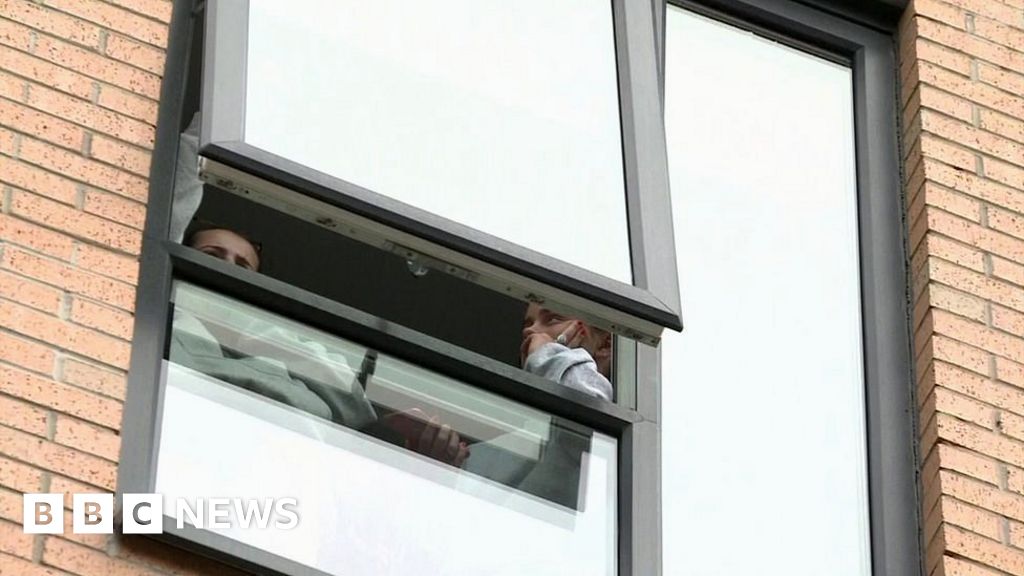 Image copyright
PA Media
Image caption
Students at Norwich school observe social distancing while receiving their results
Image copyright
PA Media
Image caption
Students at Norwich school observe social distancing while receiving their results
Head teachers are warning of "volatility" in this year's A-level results and that some lowered grades seem to be "unfair and unfathomable".
In England, 36% of entries had a lower grade than teachers predicted and 3% were down two grades, in results for exams cancelled by the pandemic.
But the overall results, across England, Northern Ireland and Wales, show higher A* and A grades this year.
Controversy has surrounded how results have been decided.
There was "deep frustration" in schools about the confusion caused by late changes to the results system, including the use of mock grades, said Geoff Barton, leader of the ASCL head teachers' union.
"While there has been an overall increase in top grades, we are very concerned that this disguises a great deal of volatility among the results at school and student level," said Mr Barton.
"We have received heartbreaking feedback from school leaders about grades being pulled down in a way that they feel to be utterly unfair and unfathomable. They are extremely concerned about the detrimental impact on their students."
The A-level results show:
9% of entries were A* (up from 7.8% in 2019) 27.9% were A* and A (up from 25.5% in 2019). 78.4% of entries were A*-C (up from 75.8% in 2019) Psychology now the second most popular subject, after maths Girls outperform boys, except in A*s In England, the moderation means that 36% of results have been lowered by one grade, 3% by two grades, 2% have increased There will be 25,000 university courses available in clearing, including 4,500 in top Russell Group universitiesThe Sixth Form Colleges Association has called the system for calculating A-level grades, "flawed and unreliable" after almost all colleges said grades were lower or much lower than predicted.
A third of college principals reported results lower or "dramatically lower" than their historic exam performance.

Media playback is unsupported on your device
Almost 300,000 teenagers will be finding out A-level results - some by email and others going into school, perhaps for the first time since they left in the lockdown in March.
Image copyright Reuters Image caption Students at Crossley Heath Grammar School in Halifax receive their resultsThe moderation process will mean about 40% of results will be different - mostly lower - than predicted grades submitted by teachers.
Schools and colleges sent these predictions to the exam boards along with a ranking of their pupils in order of ability.
The exam boards and regulators also took into account data for previous years to make adjustments to the predictions. These were aimed, they say, at ensuring the results are fair, consistent and in line with historic results.
There will be scrutiny of whether it is disadvantaged pupils who will have lost out from such changes - a problem that caused protests and a U-turn in Scotland.
Students taking vocational exams have been getting estimated results over recent weeks - with 250,000 getting BTec results this year.
For students hoping for university places, it is expected to be a "buyer's market", with the admissions service Ucas saying universities would be "super flexible", even for those who have missed grades.
There have been arguments about how estimated grades have been calculated in the absence of exams - with the two biggest factors being the ranking order of pupils and previous results at their school.
Image copyright PA Media Image caption In Scotland, protests prompted a change in how grades were calculatedIn England, head teachers angrily complained of a "shambles" at the last-minute switch to a "triple lock" in which students could get whatever was highest out of three assessments:
their estimated grade an optional written paper in the autumn or an appeal through their school if the estimated result is lower than the mock examHeads warned mock exams were run in many different ways by schools and it was wrong to try to use them to decide exam results.
England's Education Secretary Gavin Williamson told BBC Breakfast he will refuse to follow Scotland's lead in allowing students whose results were downgraded to be awarded the grades predicted by their teachers.
He said that would be "unfair to so many students", including the classes of 2019 and 2021.
He admitted there would be some students getting grades "that aren't reflective of the work they've put in" but there would be a "robust appeals process".
The education secretary said 90% of the results awarded on Thursday would be either the grade of the school or within one grade of that.
"You are going to be seeing an increase in the number of children that get an A or A* by 2% this year over last year," he said.
He congratulated students on "getting through this extraordinary year", adding that the class of 2020 would not "lose out because of Covid-19".
But Labour leader Sir Keir Starmer described the government's decision to change the system hours before results were published as "shambolic", adding that it "smacks of incompetence".
Mr Williamson said the government had earmarked £30m to help schools with the costs of running exams this autumn for students who choose this option.
He added the process had been agreed with exam regulator Ofqual before Wednesday's announcement and said the watchdog would be issuing clarity on how appeals would work, including those based on mock exam results.
Wales education minister Kirsty Williams said she had to act after other nations had changed from the agreed system of standardisation to ensure Welsh students were on a level footing.
However, she told Today universities and employers could be confident about the robustness of Welsh students grades, which are "made up by externally-assessed exams taken last year". Unlike pupils in other nations, Welsh students took AS-levels last year.
Image copyright PA Media Image caption Twins Rosy (left) and Teddy Valentine received their results at Norwich School on ThursdayThe exam boards have said the results will not show widening gaps or "unconscious bias", such as towards ethnic minority students.
But the linking of students' grades to the results of their schools in previous years will mean close attention to whether this works against disadvantaged children.
This emerged when exam results were published in Scotland - forcing a switch to using teachers' predictions.
And in England there will be concerns that bright pupils in under-performing schools could be marked down.
But Mr Williamson told BBC Breakfast that Ofqual had stated it had not seen any disparity in grade adjustments for pupils from the most deprived backgrounds or black and ethnic minority communities, which he said was "incredibly important".
England's exam watchdog has said that if teachers' predictions had been used it would have inflated results - so that about 38% of entries would have been A* or A grades.
Image copyright PA Media Image caption After the long wait, students will be hoping for good news in their resultsBut using a system that relies on ranking pupils by ability could create a "lottery" in grades for those in the middle ranges, says Prof Alan Smithers of the University of Buckingham, in an annual pre-results analysis.
He says that while those pupils at the top and bottom ends of the ability range will be clear, it is harder to "distinguish those in the middle", with the risk of ranking decisions being "inaccurate and unfair".
Mr Williamson has defended the robustness of the replacement grades and told those getting their results that "they should feel proud of everything they have achieved in the most extraordinary and difficult circumstances".
Have you got your A-level or BTec results today? Are there any questions you'd like to ask our experts? Share your stories by emailing haveyoursay@bbc.co.uk.
Please include a contact number if you are willing to speak to a BBC journalist.

 5 years ago
1142
5 years ago
1142 
